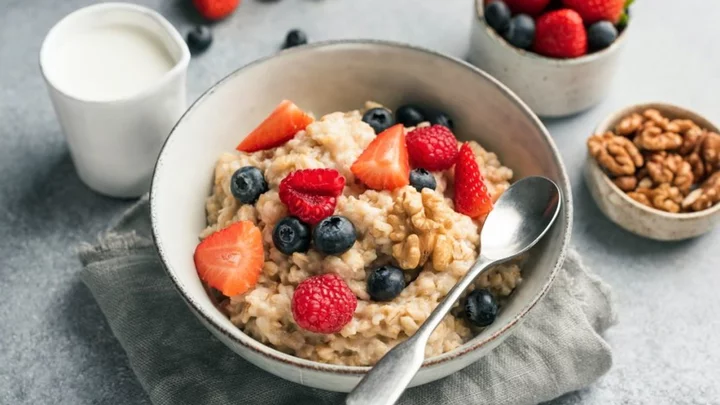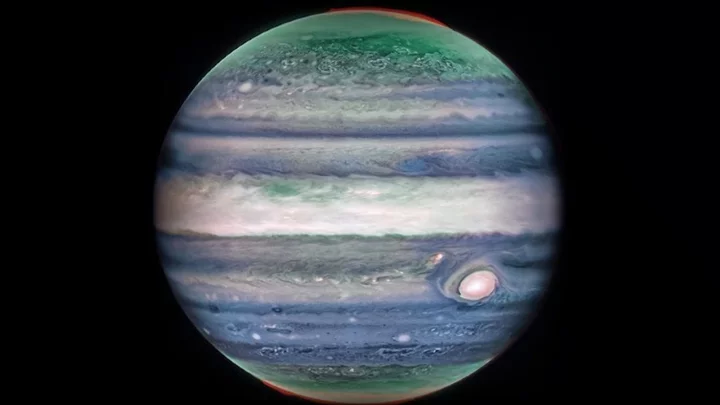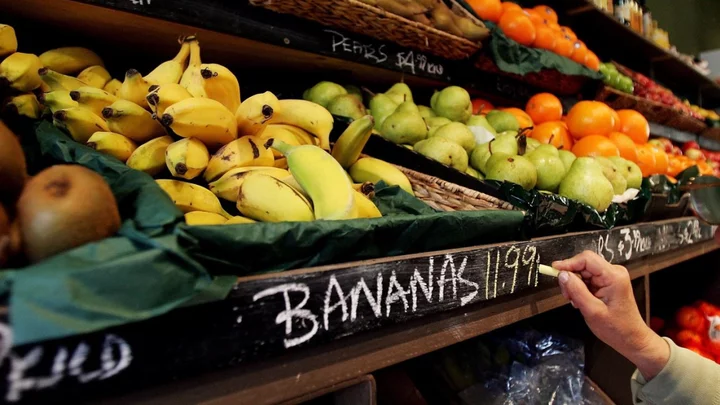
Rare moments captures python engaging in cannibalism
A species of snake has been seen engaging in cannibalistic behaviour after the incident was captured on camera. In Far North Queensland, Australia, a coastal region in the north of Queensland, a black-headed python was witnessed eating another member of the same species. The rare scene was witnessed at the Australian Wildlife Conservancy’s (AWC) Piccaninny Plains Wildlife Sanctuary where the manager, Nick Stock, was in for quite a shock. In fact, Stock had to get closer to the snakes to realise that what he was witnessing was a scene of cannibalism, as he saw a black-headed python that had constricted another smaller one and was eating it, tail first. In a statement about the incident, Stock explained: “Fortunately for me but not-so-fortunately for the python being consumed, it took around 15 minutes from when I first witnessed the initial constriction to the python finishing its meal and returning to its burrow which was only about 10 feet away.” Stock revealed he grabbed his camera and documented the rare event. While experts have witnessed pythons eating other species of snake, capturing a species eating one of its own kind on camera is unusual. “I have previously witnessed Black-headed Pythons eating an Eastern Brown Snake and a Yellow Spotted Monitor, however, this was the first time I witnessed a Black-headed Python eating another Black-headed Python,” Stock said. The behaviour is rarely caught on camera outside of captivity, but ecologist Helena Stokes says the phenomenon is not as uncommon as people might think. She explained: “Black-headed Pythons prefer to eat reptiles over mammals and are known to eat larger reptiles including goannas, and even venomous snakes, so I’m not surprised that they would consume another python if the opportunity arose.” Sign up to our free Indy100 weekly newsletter How to join the indy100's free WhatsApp channel Have your say in our news democracy. Click the upvote icon at the top of the page to help raise this article through the indy100 rankings.
2023-10-24 22:55

Bitcoin soars to near 18-month high as ETF speculation mounts
By Tom Wilson and Tom Westbrook LONDON/SINGAPORE (Reuters) -Bitcoin rose 6% on Tuesday to to $35,198, its highest in nearly
2023-10-24 22:27

The battery test race to work out what used EVs are really worth
(This Oct. 23 story has been corrected to mention that Driverama is a unit of Aures Holdings in paragraph 15)
2023-10-24 21:55

Nvidia says U.S. speeded up new export curbs on AI chips
Chip designer Nvidia said new U.S. export restrictions blocking the sales of its high-end artificial intelligence chips to
2023-10-24 21:21

Convincing yourself food is highly calorific could suppress your appetite
A study suggests that convincing yourself that food has a higher calorie content may suppress your appetite and help you lose weight. Alia Crum and her colleagues at Yale University gave 46 healthy volunteers the same 380-calories milkshake. However, some participants were told it was a low-calorie choice, whilst others were told it was high in calories. The 'low-calorie' bottle of the shake claimed it to have zero percent fat, zero added sugar and be only 140 calories. Whilst the 'high-calorie' bottle was labelled as 'indulgent' and accounted to 620 calories. The team measured levels or ghrelin before and after volunteers drank the shake. Ghrelin is a hormone released by the stomach when we are hungry. "It also slows metabolism," Crum said, "just incase you might not find that food." Once you have a big meal after you ghrelin rises, your level proceed to drop again, telling your brain that you've had enough to eat and it's time to start metabolising, in order to burn the calories ingested. Meaning that when we have something like a small salad, ghrelin levels don't drop as much, and metabolism isn't triggered in the same way. For a while, scientists believed that ghrelin levels change in response to the nutrients in your stomach. But Crum's study pushed back on that belief. If participants believed they were drinking the high-calorie shake, the body responded as though the participants had consumed more than they actually had. "The ghrelin levels dropped about three times more when people were consuming the indulgent shake (or though they were consuming the indulgent shake)," Crum said. However, it doesn't mean the nutrients doesn't matter, but Crum suggests that the metabolic model may need to be rethought. "Our beliefs matter in virtually every domain, in everything we do," Crum says. "How much is a mystery, but I don't we've given enough credit to the role of our beliefs in determining our physiology, our reality." Sign up to our free Indy100 weekly newsletter Have your say in our news democracy. Click the upvote icon at the top of the page to help raise this article through the indy100 rankings. How to join the indy100's free WhatsApp channel
2023-10-24 21:21

Logitech feeling more confident after Q2 - CFO
ZURICH Logitech International is feeling more optimistic after slowing its rate of sales decline and offsetting the downturn
2023-10-24 20:28

Surprise discovery shows major feature on Jupiter that experts had previously missed
Despite being by far the largest planet in the solar system, experts are still making surprise discoveries about Jupiter. The planet is only beaten in size by the Sun and as technology has evolved, scientists have sent multiple probes to investigate Jupiter. Despite all the scientific work that has gone into investigating the stripes and swirls that give Jupiters its well-known appearance, experts have only just discovered the existence of a high-speed jetstream above the clouds around the planet’s equator. The jetstream is a whopping 3,000 miles wide and was discovered thanks to the infrared data gathered by the James Webb Space Telescope (JWST) currently orbiting the Sun. Its discovery is giving experts an insight into how the planet’s atmosphere works, as well as its ill-understood weather phenomena. Ricardo Hueso from the University of the Basque Country in Spain is the lead author of the study, published in Nature Astronomy and explained: “This is something that totally surprised us.” He added: “What we have always seen as blurred hazes in Jupiter’s atmosphere now appear as crisp features that we can track along with the planet’s fast rotation.” Scientists have long been aware of light and dark clouds that are known as zones and belts that travel around the planet in different directions and at differing altitudes, but how this occurs has left them baffled. Analysis of the data collected by the JWST revealed the jetstream that was previously only just visible but very hazy. Data confirmed that it sits around 25 miles above the clouds and travels around Jupiter’s equator at around 515 kilometres per hour (320 mph). The researchers compared their data with that collected from the Hubble’s observations of the lower cloud levels and concluded that the jetstream may form part of a weather pattern. Planetary scientist Leigh Fletcher from the University of Leicester, explained: “Jupiter has a complicated but repeatable pattern of winds and temperatures in its equatorial stratosphere, high above the winds in the clouds and hazes measured at these wavelengths.” He added: “If the strength of this new jet is connected to this oscillating stratospheric pattern, we might expect the jet to vary considerably over the next two to four years – it'll be really exciting to test this theory in the years to come.” Sign up to our free Indy100 weekly newsletter How to join the indy100's free WhatsApp channel Have your say in our news democracy. Click the upvote icon at the top of the page to help raise this article through the indy100 rankings.
2023-10-24 19:16

Sony's PlayStation Access controller offers a new social lifeline for gamers with disabilities
Grant Stoner said that he has loved playing video games his entire life, and that his earliest memory is of playing Super Nintendo in his parents' bedroom at roughly 3 years old.
2023-10-24 18:50

Scientists warn bananas could go extinct as disease ravages fruit
Bad news for banana lovers – scientists have warned that the fruit could face extinction, after a fungal disease outbreak. Crops of the Cavendish banana have been hit by an infection called Panama disease, with those in Asia, Africa, the Middle East, Australia and central America particularly badly affected. The disease, which is also known as banana wilt, starts in the roots of the banana tree and then spreads through its vascular system. Ultimately, it stops the plant from absorbing water or carrying out photosynthesis, eventually killing the tree. For Cavendish banana growers, it could spell disaster. While there are more than 1,000 varieties of bananas, about 47 per cent that humans eat are Cavendish. Cavendish has historically dominated the global banana market since the 1950s, partly because of its resistance to the main banana-killing diseases. It also has a long shelf life, making it more attractive for international import and export, and the plant also produces more bananas than other varieties on the same amount of land. Part of the reason scientists think it could be endangered is because of what happened to another popular banana variety called the Gros Michel. Gros Michel was the main export banana in the early 20th century, but was practically wiped out by a predecessor disease to the one hitting Cavendishes now. The first infections of Gros Michel farms began in the late 19th century and took several decades to affect production to the point where growers were looking for a new variety to sell. Cavendish, meanwhile, was first hit by the current strain of Panama disease in 1997, and it has now spread across several continents. However, scientists are working on a genetically modified version of the banana to fight to infection. James Dale, a professor and leader of the banana biotechnology program at Queensland University of Technology, is working on the project. He told Insider: “The disease moves slowly, so we have at least a decade before the impact is drastic.” “I would say with certainty that there will be a solution before the export market for Cavendish is severely affected.” Let’s hope he’s right. How to join the indy100's free WhatsApp channel Sign up to our free Indy100 weekly newsletter Have your say in our news democracy. Click the upvote icon at the top of the page to help raise this article through the indy100 rankings.
2023-10-24 18:21

Scientists think orcas might be getting smarter as they show frightening new behaviours
As if orcas weren’t frightening enough, experts think they are getting even smarter as they have started to learn some terrifying new behaviours. The whale species, commonly known as killer whales, is an apex predator that has learned to adapt its hunting methods to a variety of different prey. In March 2019, researchers were stunned when they witnessed the first documented case of a pod of orcas working as a team to kill one of the largest animals on the planet, a blue whale. The gruesome incident took place on the coast of southwestern Australia as experts watched as a dozen orcas bit chunks out of the adult blue whale, slowly wearing it down until it finally died an hour later. While it may have been the first recorded case, it has not been the last. Additionally, a small population of orcas on the coast of Spain and Portugal have become fans of ramming and damaging boats, sometimes causing enough destruction to sink them. Elsewhere, orcas have been seen abducting baby pilot whales and tearing the livers out of sharks that later wash up on shore. Deborah Giles, an orca researcher at the University of Washington and the nonprofit Wild Orca explained to Live Science: “These are animals with an incredibly complex and highly evolved brain. They've got parts of their brain that are associated with memory and emotion that are significantly more developed than even in the human brain.” But, while the actual anatomy of the animals’ brains hasn’t changed, their ability to learn is what is making orcas smarter than ever before. They implement what is known as social learning, where younger members of the pods observe and learn hunting methods from the adults, particularly the dominant matriarch, who themselves, are always learning. Josh McInnes, a marine ecologist at the University of British Columbia, explained: “This behaviour may be being shared between individuals, and that's maybe why we're seeing an increase in some of these mortality events.” But, while experts think they are getting smarter, they also think it may be leading to the breakup of large pods of orcas. Michael Weiss, a behavioural ecologist and research director at the Center for Whale Research in Washington state, said: “Their social bonds get weaker because you can't be in a big partying killer whale group if you're all hungry and trying to search for food.” Sign up to our free Indy100 weekly newsletter How to join the indy100's free WhatsApp channel Have your say in our news democracy. Click the upvote icon at the top of the page to help raise this article through the indy100 rankings.
2023-10-24 17:54

Governments, firms should spend more on AI safety, top researchers say
By Supantha Mukherjee STOCKHOLM Artificial intelligence companies and governments should allocate at least one third of their AI
2023-10-24 14:51

China's Huawei sells 1.6 million Mate 60 series handsets in six weeks - research firm
SHENZHEN, China (This Oct. 19 story has been corrected to say '1.6 mln Mate 60 series sold', not
2023-10-24 12:57
